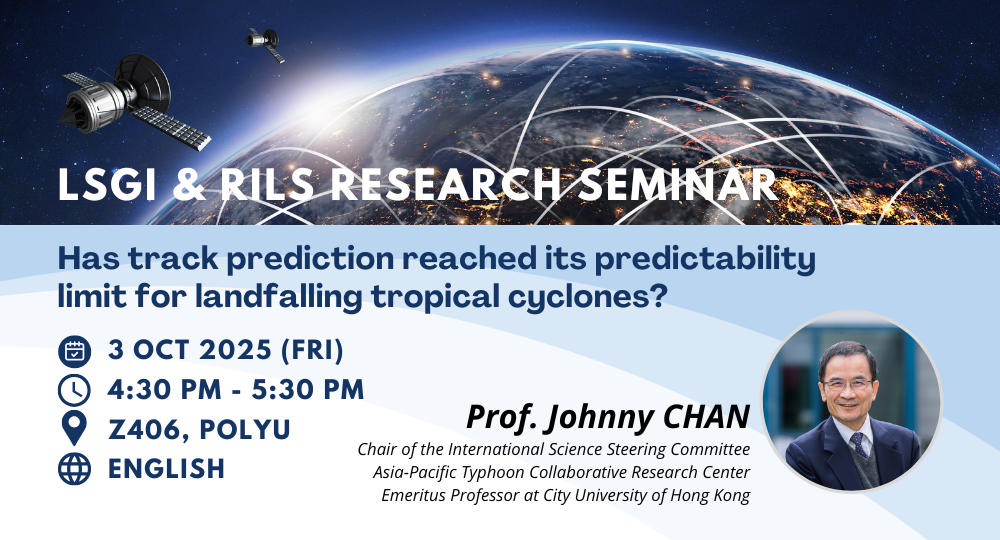Has track prediction reached its predictability limit for landfalling tropical cyclones?

-
Date
03 Oct 2025
-
Organiser
Department of Land Surveying and Geo-Informatics (LSGI) & Research Institute for Land and Space (RILS)
-
Time
16:30 - 17:30
-
Venue
Z406 Map
Speaker
Prof. Johnny CHAN
Remarks
Moderator: Prof. George LIU, Professor of LSGI, member of RILS
Summary
In the last two decades, significant improvements have been made in the track prediction of tropical cyclones (TCs). Some have suggested that because of the uncertainties in the data and the identification of the TC centre, track prediction has reached its predictability limit. While this might be likely on the average, it will be shown in this study that for landfalling TCs, appreciable track errors still exist. This is especially important because a wrong landfall location would lead to a misplacement of disaster preparedness efforts, and hence potential large loss of life and property.
We first present case studies demonstrating the “systematic” biases in the numerical weather prediction (NWP) models in their prediction of landfalling TCs. Specifically, the predicted tracks tend to be slower and to the right of the observed ones. Results of idealized numerical simulations show that different land surfaces can lead to changes in both the direction and speed of landfalling TCs. Modifying the land-surface representation for real TCs in numerical experiments show that the predicted tracks are much closer to the observed. These results suggest the importance of re-examining the land surface distribution as well as boundary-layer parameterization in the NWP models.
Keynote Speaker
Prof. Johnny CHAN
Chair of the International Science Steering Committee
Asia-Pacific Typhoon Collaborative Research Center
Emeritus Professor at City University of Hong Kong
Professor Johnny Chan is currently the Chair of the International Science Steering Committee of the Asia-Pacific Typhoon Collaborative Research Center and an Emeritus Professor at City University of Hong Kong (CityU), where he was Chair Professor of Applied Physics/Atmospheric Science before his retirement in June 2021. He was the Founding Dean of the School of Energy and Environment (SEE) of CityU, and served as the Director of the Guy Carpenter Asia-Pacific Climate Impact Centre of SEE, CityU and the Director of the Shanghai Typhoon Institute of the China Meteorological Administration. Professor Chan is internationally renowned in the research areas of typhoons, monsoons and climate change.He has published close to 300 international journal articles and presented over 350 invited talks and conference papers. Professor Chan was a Review Editor of the Intergovernmental Panel on Climate Change Assessment Report Six (Working Group I), a member of the Tropical Meteorology Research Working Group of the World Meteorological Organization of United Nations and the Chair of its Tropical Cyclone Panel between 2012 and 2018. He also serves in the editorial board of several international journals and book series. Professor Chan’s honours include Distinguished Alumnus of the Department of Atmospheric Science, Colorado State University, Honorary Member of the Asia-Oceania Geosciences Society, Special Expert of the China Meteorological Administration, Honorary Fellow of the UK Energy Institute, Fellow of the American Meteorological Society, recipient of the International Journal of Climatology Award of the Royal Meteorological Society, Distinguished Meteorologist awarded by the Hong Kong Observatory, and a Senior Research Fellowship awarded by the Croucher Foundation.




